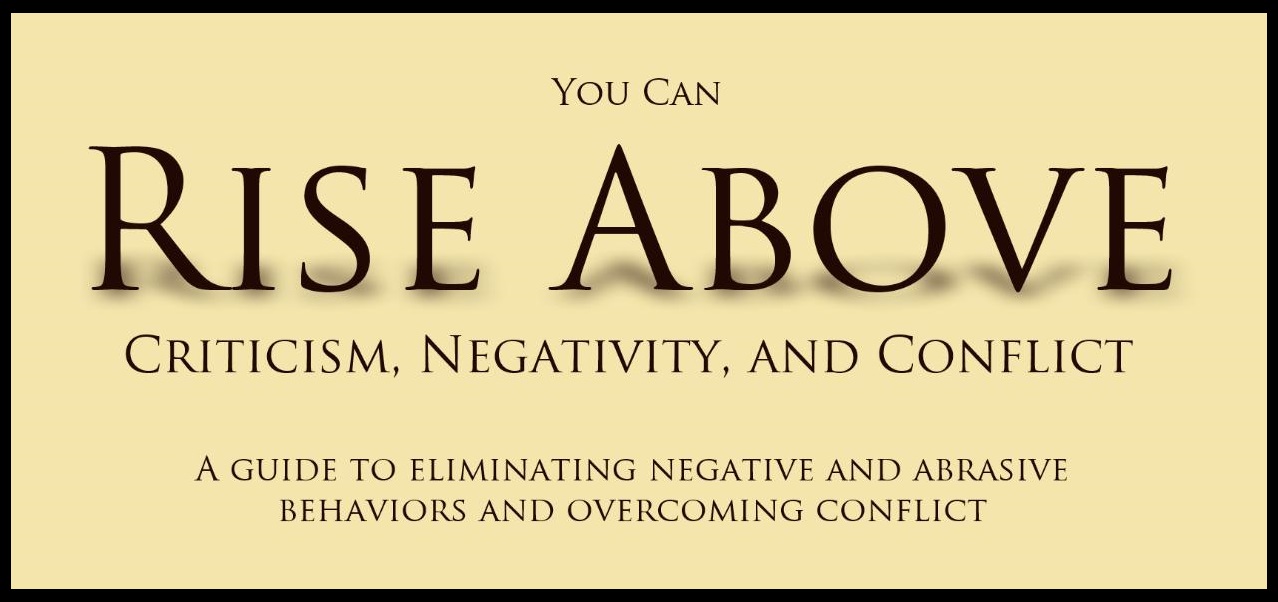
It’s not easy being criticized by others. It cuts to the core, and it hurts.
Why does the criticism hurt? It hurts because we are experiencing negative emotions as a result of the criticism, obviously, but why do we experience the negative emotions?
In my book, Rise Above Criticism, Negativity, and Conflict, I dive into the investigation of our emotions and why we experience them.
Essentially, when we are experiencing a positive emotion, our needs are fulfilled, but when we are experiencing a negative emotion, one or more of our needs are not being met.
So now it’s clear that our negative emotions that arise as a result of the criticism are coming from a need within us that is not being met. Maybe it’s a need to be understood, or a need to be recognized as competent. Maybe it’s some other need that arises and is not fulfilled. The beauty of the system is that it’s really up to you individually to determine what the need is.
Once you identify that need, then it’s also up to you to either fulfill that need or to ask others to help you to fulfill that need. So, for example, if you have a need to be understood, perhaps you could say, “Could you please help me understand where I’m not being entirely clear so that I can clarify and clear up any misunderstandings?
This would allow the other person to provide you with the information so that you can resolve your unmet need.
However, this doesn’t help you necessarily get past the criticism of other people. It just helps you get to a place of more positive emotions.
To get past the criticism of other people, it’s important to remember one important thing:
So, when someone tells you that your idea is horrible, what they’re really saying is that they’re not getting something they need, and they are (in a very masked way) asking you to help them meet that unmet need.
But, before you can even start to move to a place where you can help them meet their unmet need, you need to check your ego at the door. You can’t be thinking in the back of your head that they are just trying to be manipulative, cover up their mistakes, play politics, or that they have other ulterior motives that are suspect. When you move to this place you are simply interpreting and diagnosing their behaviors, and when you move to that type of thinking you’ll get nowhere. Interpreting and diagnosing is a form of judging — it’s a form of labeling something as “right” and “wrong.”
Sensitive issues such as criticism need to be handled delicately and sensitively. It’s hard to be sensitive and delicate when someone is criticising you, but that’s exactly what is called for. Because it seems so counterintuitive, so few people handle criticism this way.
Perhaps “Bob” said that your idea was horrible because he is frustrated because he feels that his ideas aren’t being included in the discussion. All you can do is guess. Maybe just asking Bob what specifically he doesn’t like about the idea will shed light on what his unmet needs are.
Once you can determine what the unmet need is, you can either ask if that’s what Bob needs, or you can just make a suggestion to move in that direction, and see what his reaction is. If he responds peacefully and cooperatively, chances are you’ve met a need of his, and he’s experiencing a more positive emotion internally as a result.
Criticism is never really about us. It is completely about what’s going on internally with the person who criticizes. That doesn’t mean that we’re not relieved of responsibility toward helping them meet their needs, however. If you can identify that there is an unmet need, you can do a tremendous service to the criticizer by helping them meet their needs, and for that, you’ll be recognized as a master communicator and a tremendous leader, and people will know that they can count on you to help them get to a better place.
Did you find this post helpful? Do you think you can apply this to your own situations? Let me know in the comments below!
Session expired
Please log in again. The login page will open in a new tab. After logging in you can close it and return to this page.
a very nice article. Thank you for writing and sharing. Love the message of your blog. Direct motivation for myself and my online adventures. Thanks again
Thank you motivation guru! I appreciate you stopping by.